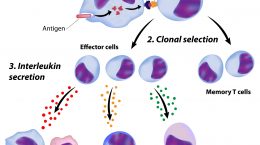Published on February 12, 2020

In our previous posts about the immune system, we have touched on a basic overview of the innate and adaptive immune system and the role that vitamin D plays in the body’s initial defense against a pathogenic invasion. Today, we cover the complex role of vitamin D within the adaptive immune system, and tie both together to clearly illustrate the full significance of vitamin D to immunity.
More Complex Vitamin D Dependent Functions in the Adaptive Immune Response
 As reviewed previously, the adaptive immune system is the second line of defense activated specifically to fight pathogens; it has the ability to learn about a particular pathogen, remember it, and enhance response to it in the case of future infections.
As reviewed previously, the adaptive immune system is the second line of defense activated specifically to fight pathogens; it has the ability to learn about a particular pathogen, remember it, and enhance response to it in the case of future infections.
The most well-established function of vitamin D on adaptive immunity, specifically in response to a pathogen such as a virus, is its role in creating new T cells, a type of white blood cell, and regulating their function.
Naïve T cells are T cells that have the ability to differentiate into different types of immune cells which then determine the type of immune response. Naïve T cells must also become ‘activated’ or primed in order to substantially increase their ability to identify and bind to a pathogen infected cell and destroy it. Both of these processes require vitamin D.
Below are several ways vitamin D is involved in the adaptive immune response:
ACTION: Vitamin D is needed to activate T cells, turning naïve T cells into primed T cells that are better able to respond to a pathogen
ACTION: Vitamin D influences T cell differentiation to induce lower levels of inflammatory cytokines and higher levels of anti-inflammatory cytokines
ACTION: Vitamin D regulates the maturation of the dendritic cells, another type of white blood cells, to then modulate helper T cell (Th) function
ACTION: T cells respond directly to active vitamin D by developing regulatory T cells
Tying it All Together
The above diagram from Hewison, Clinical Endocrinology, 2012, illustrates the multiple roles of vitamin D in the innate and adaptive immune system. The right side shows the activity of vitamin D in the innate immune system; the presence of vitamin D and its conversion from within these cells (intracrine action) induces the release of antibacterial cytokines from the monocytes, macrophages, and epithelial cells. The presence of activated vitamin D (1,25D) also acts directly on the cells to achieve the same antimicrobial activity (endocrine action).
The left side of the diagram shows the adaptive immune responses to vitamin D, from regulating the maturation of the dendritic cells (DC) to modulating helper T cell (Th) function. T cells also respond directly to active vitamin D by developing regulatory T cells.
“Collectively these observations suggest that vitamin D is a key factor linking innate and adaptive immunity, and both of these functions may be compromised under conditions of vitamin D insufficiency.”
What Now?
As we have shown above, the immune system relies on vitamin D in many ways to orchestrate the proper, most effective immune response against a pathogenic invasion. Doesn’t it make sense to ensure a healthy vitamin D level in order to both help prevent infection (stop it at our most outer defenses) and to fight it off in the most efficient way possible?
Is your immune system strong enough to help you stay healthy?
Make sure you know your vitamin D level, and take steps to keep it within a target of 40-60 ng/ml or 100-150 nmol/L! Through GrassrootsHealth Nutrient Research Institute, you can also test your essential elements magnesium, copper, zinc and selenium, toxins such as lead, mercury and cadmium, as well as your omega-3 levels, inflammation levels and thyroid stimulating hormone (TSH) level. Find out your levels today! Log on to the test selection page (click the link below) to get your tests and see for yourself if your levels can be improved.
Make sure you track your results before and after, about every 6 months!
Click Here to Access the Test Page
How can I track my nutrient intake and levels over time?
To help you track your supplement use and nutrient levels, GrassrootsHealth has created the Personal Health Nutrient Decision System called

For each specific supplement, you can track what days you take it, how much, and many other details. This will help you know your true supplemental intake and what patterns of use work for you to reach and maintain optimum nutrient levels. Check it out today!







